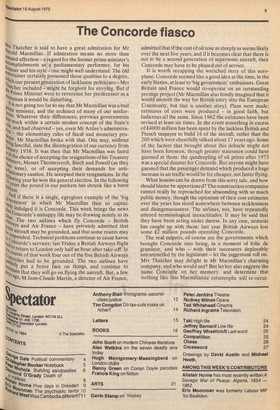The Concorde fiasco
tirs Thatcher is said to have a great admiration for Mr arold Macmillan. If admiration means no more than "alkised affection — a regard for the former prime minister's 11ec0mp11shments as a parliamentary performer, for his 4 p olour and his style one might well understand. The old -11tertainer certainly possessed those qualities to a degree, \'Ilkillehour present generation of lacklustre politicians — Mrs suateher included — might be forgiven for envying. But if sge Prime Minister were to reverence her predecessor as a tattesman it would be disturbing. 11,,t is not going too far to say that Mr Macmillan was a bad rtilitte minister, and the architect of many of our misfor0,es. Whatever their differences, previous governments r7 stuck within a certain modest concept of the State's ti3le, and had observed — yes, even Mr Attlee's administrac6°4 the elementary rules of fiscal and monetary prub'elce. Mr Macmillan broke with that. One may, without j,g1g fanciful, date the disintegration of our currency from vilary 1958. It was then that Mr Macmillan was faced 4th. the choice of accepting the resignations of his Treasury tLtlisters, Messrs Thorneycroft, Birch and Powell (as they bigccIll Were), or of accepting their demands for antiforationary caution. He accepted their resignations. In the Zo',.°Iving year he won the general election. In the following b Years the pound in our pockets has shrunk like a burst goAnd if there is a single, egregious example of the 'big ouviernmene in which Mr Macmillan then so capncitbf:Y indulged it is Concorde. This week brings the news 00 Concorde's unhappy life may be drawing noisily to its Airse. The two airlines which fly Concorde — British aYs and Air France — have privately admitted that be'e aircraft may be grounded, and that some routes may cslIsPended. Technical problems continue to cause havoc lia,ci?ncorde's services: last Friday a British Airways flight the L° return to London only half an hour after take-off In course of that week four out of the five British Airways pliACordes had to be grounded. The two airlines have lelY put a brave face on things, and continue to tai n that they will go on flying the aircraft. But, a few ago, M Jean-Claude Martin, a director of Air France, admitted that if the cost of oil rose as steeply as seems likely over the next five years, and if it becomes clear that there is not to be a second generation of supersonic aircraft, then Concorde may have to be phased out of service.
It is worth recapping the wretched story of this aeroplane. Concorde seemed like a good idea at the time, in the early Sixties, at least to 'big government' enthusiasts. Great Britain and France would co-operate on an outstanding prestige project (Mr Macmillan also fondly imagined that it would smooth the way for British entry into the European Community, but that is another story). Plans were made; estimates of costs were produced — in good faith, but ludicrous all the same. Since 1962 the estimates have been revised at least six times. In the event something in excess of £4000 million has been spent by the luckless British and French taxpayer to build 16 of the aircraft, rather than the 200 which were cheerfully talked about 17 years ago. Some of the factors that brought about this debacle might not have been foreseen, though greater statesmen could have guessed at them: the quadrupling of oil prices after 1973 was a special disaster for Concorde. But anyone might have guessed that the passenger demand which produced a huge increase in air traffic would be for cheaper, not faster flying.
What lessons can be drawn from this sorry tale, and how should blame be apportioned? The construction companies cannot really be reproached for absconding with so much public money, though the optimism of their cost estimates over the years has stood somewhere between recklessness and disingenuousness. The airlines, too, have repeatedly uttered terminological inexactitudes. It may be said that they have been acting under duress. In any case, nemesis has caught up with them: last year British Airways lost some £2 million pounds operating Concorde.
The real culprits, of course are the governments which brought Concorde into being, in a moment of folie de grandeur, and who — with their successors deplorably untrammelled by the legislature — let the juggernaut roll on. Mrs Thatcher may delight in Mr Macmillan's charming company, and who would not? But let her also engrave the name Concorde on her memory, and determine that nothing like this Macmillanite catastrophe will re-occur.






























 Previous page
Previous page